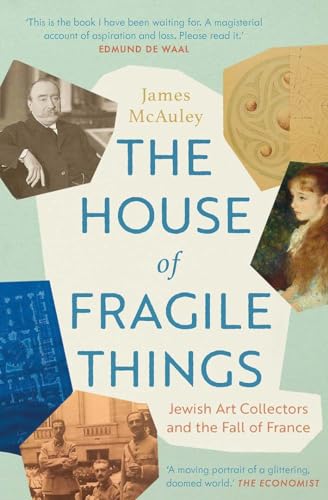The House of Fragile Things
Jewish Art Collectors and the Fall of France
James McAuley
BOOK REVIEW

In a world teetering on the brink of chaos, The House of Fragile Things: Jewish Art Collectors and the Fall of France by James McAuley unveils a haunting narrative that strikes at the core of cultural identity and human fragility. This is not just a book; it's a chilling exploration of loss, identity, and the devastating impact of war on art and culture. Each page invites you to step into a world where the gilded frames of a classic gallery serve not only as adornments but as tombstones for a civilization that once flourished.
McAuley's meticulously researched work is a poignant testament to a community that cherished art as life itself. He intricately weaves the stories of Jewish art collectors in France, who meticulously curated their identities through their prized possessions, only to watch them slip through their fingers like sand. As you read, the fabric of their lives unravels with each chapter, revealing the bitter irony of their affluence crumbling in the face of impending doom.
The narrative transcends mere historical recounting; it immerses you in the visceral experiences of its protagonists-their passion for art, the joy it brought them, and ultimately, the despair of watching their world disintegrate. McAuley not only paints the backdrop of a France on the brink of collapse during World War II, but he also gives voice to the collectors whose masterpieces echo the complexities of their existence. Your heart will ache as you grasp their plight-their efforts to preserve beauty in a world spiraling into darkness.
What makes this work stand out is its ability to evoke strong emotions while educating its readers about a lesser-known aspect of Holocaust history. McAuley deftly juxtaposes the vibrancy of Jewish culture with its obliteration, urging his audience to confront uncomfortable truths. As he navigates the political climate of the time, readers are left to ponder the critical importance of cultural preservation, as well as the chilling reality of how easily history can erase entire communities.
Readers have found the book to be both illuminating and sobering, with many praising its lyrical prose and insightful commentary. However, some critiques suggest that while the narrative is compelling, certain sections may feel overly dense for casual readers. Still, behind every disagreement lies a shared understanding of the book's essential value. It opens a dialogue about responsibility-how we safeguard our cultural legacies and recognize the fragility of our histories.
McAuley's personal background adds layers to his narrative, offering context to his drive in unraveling the stories of these collectors. With roots steeped in history, he meticulously crafts a narrative that mirrors the tensions and complexities of his own heritage. The echoes of his prose resonate with urgency, compelling the reader not just to absorb facts, but to feel the weight of that history.
As the world wrestles with issues of identity, displacement, and the preservation of culture, The House of Fragile Things becomes a rallying cry-a stark reminder that art and culture, once compromised, can lead to a loss that transcends generations. This work is a beacon urging us to confront our past while fuelling a passionate commitment to safeguard our shared legacies.
In the wake of such a narrative, the question remains: are we as a society doing enough to cherish and protect our cultural identities? As you close this book, you're left not only with thoughts of the past but with a call to action-an imperative to engage with our histories actively and empathetically. This is not just McAuley's story; it's a universal plea for recognition and remembrance, urging you to participate in the preservation of our fragile world. 🌍💔
📖 The House of Fragile Things: Jewish Art Collectors and the Fall of France
✍ by James McAuley
🧾 320 pages
2022
#house #fragile #things #jewish #collectors #fall #france #james #mcauley #JamesMcAuley